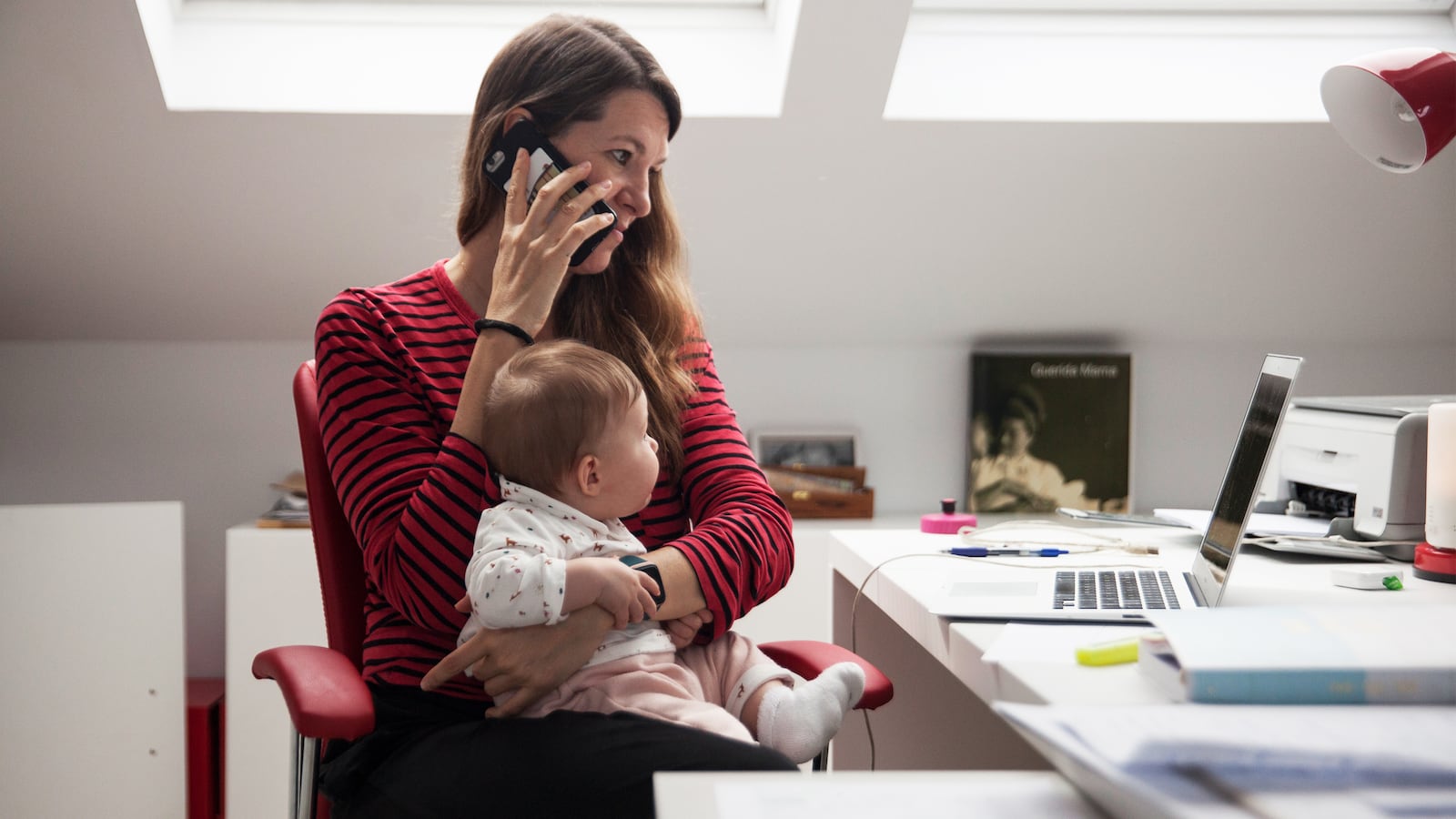Nobody enjoys the freedom of working from home more than I do, and I’ve been choosing that most of my career. But as the pandemic persists and as more women opt to work remotely, we need to beware of when this choice is not really a choice.
Over 25 years ago, I left a large firm in Manhattan to start my own law practice. Out on my own, I had calls forwarded from a business center on Madison Avenue to my home, and I simply showed up to meet my clients in one of the center's fancy conference rooms. They assumed I was working on Madison Avenue, but I was really practicing law from a Greenwich Village apartment, hanging out at the local coffee shop on my breaks.
At that firm I’d struggled along with my female coworkers to fit in to the male-oriented culture. I saw women judged for going home at 6 p.m. to take care of their children and excluded from larger projects when they were able to secure flexible work schedules. I didn’t have kids yet and was in the office all the time. Even so, I found it hard to deal with the extended after-hours drinking meetings and the golf dates where “the real business” got done. This culture affected women’s ability to get the best work assignments and get ahead.
Decades later, after a year of crisis in which my life was up-ended and being completely out on my own no longer made sense, I find myself back in an office setting. But, as the part-time CFO of The Motherhood Center, a day hospital for women with perinatal mood and anxiety disorders, I’m in an office created by and for women. Here all the staff is female, and flexible schedules were the norm pre-pandemic.
Now, I and other employees have the additional option of working virtually or returning to the physical office full-time or hybrid. When I first heard this, I thought, “Finally, our day has arrived!” A working mom's dream, right? Not having to commute, seeing our children more, and still succeeding in the business world.
But I question what will happen in other, still male-dominated workplaces if mostly men begin to return to the physical office while more women chose virtual work.
As I discuss in my new book, A Year Without Men, women are already battling to be heard in corporate America. We get fewer promotions to high-level management positions, are under-represented in the C-suite, have lower salaries, and struggle to raise funding for new ventures. At first glance, the choice for women might seem similar to my fabulous stint as a one-woman show on Madison Avenue before I had children. But unless workplaces truly transform, teleworking for women could end up being more like my negative experience at the large law firm years ago. If we are not part of the day-to-day culture cultivated in a physical environment, this virtual world has the potential to turn the clocks back on the progress women have made.
According to the Harvard Business Review’s “Why WFH Isn't Necessarily Good For Women,” women working virtually expands work time and increases domestic responsibilities, leaving us with even less work-life balance. There are reduced opportunities for face-to-face networking and informal contact with male decision-makers in a virtual world. Not being in the office, we miss impromptu coaching from superiors and casual conversations that lead to new projects. We miss forming bonds during lunch or at after-work gatherings. It is also interesting to note that a decision that might seem so liberating was not the result in a study that found a majority of men (57 percent) believe that working from home has had a positive effect on their careers, and fewer than a third of women (29 percent) could say the same. That same study also said that 77 percent of men with children at home believed they were more productive remotely compared to 46 percent of women.
It is hard to know exactly how many men and women will choose remote work as companies and their employees are still trying to figure the landscape of a post pandemic world. I believe when the dust settles, there will be considerably more women than men choosing virtual positions. Why? It’s not a real choice. Many women will opt for a virtual or hybrid model because workplaces fail to provide equity to women. At home, too, we shoulder more of the burden of housework and childcare. As many women are always asked to do, we will make the best choice in a not entirely fair situation. And if this choice comes with more demands at home and fewer opportunities at work, many of us might find we are far from the life we set out to have when we chose a family and a career.
During challenging times, societal inequities rise to the top. We see this with women losing their jobs at higher rates than men during the pandemic. We also saw women having to leave work to take care of children or aging parents.
As we go back into the post-pandemic workplace and make our choices about new virtual options, women must be wary that virtual work for women is more a consequence of inequality than a cure. Yes, being closer to children and home may be right for some of us. But we need to have our eyes wide open about the consequences of this option in a world where domestic responsibilities aren’t evenly split, there is a lack of childcare affordability and access, and not every workplace culture truly welcomes working moms or offers equity to women of all ages.
As I look back on my career, which led me out of practicing law to become a business consultant and life strategist and now the part-time CFO of The Motherhood Center, I am happy with the choices I made. But I am also clear that had someone mentored me in that large firm where I started, if someone had shown me a path to cultivate clients or given me the flexibility to have kids and stay on a partnership track, I probably wouldn't have gone off on my own with that “Madison Avenue” office. Really, it was born out of a culture that did not fully accept me as a woman. I love the idea of women going out on their own and starting new businesses, but many of us will want or need to stay in corporate America. Whether we are in the physical office or working from home, nothing will change unless society takes this opportunity to fully extend a welcome mat to women, to do so in a way that authentically honors who we are and sets us—and itself—up for real success.
Allison Carmen is a business consultant, life strategist, podcaster, and the author of A Year Without Men: A Twelve Point Guide to Inspire + Empower Women and The Gift of Maybe: Offering Hope and Possibility in Uncertain Times. Allison is also the CFO of The Motherhood Center of New York, a women-run day hospital in New York City providing care to women suffering with perinatal mood and anxiety disorders. Allison writes for several large online publications including Psychology Today and is a sought-after guest on radio and other online media platforms. Allison has a B.A. in accounting, a J.D. of Law, and a Master’s of Law in taxation.






